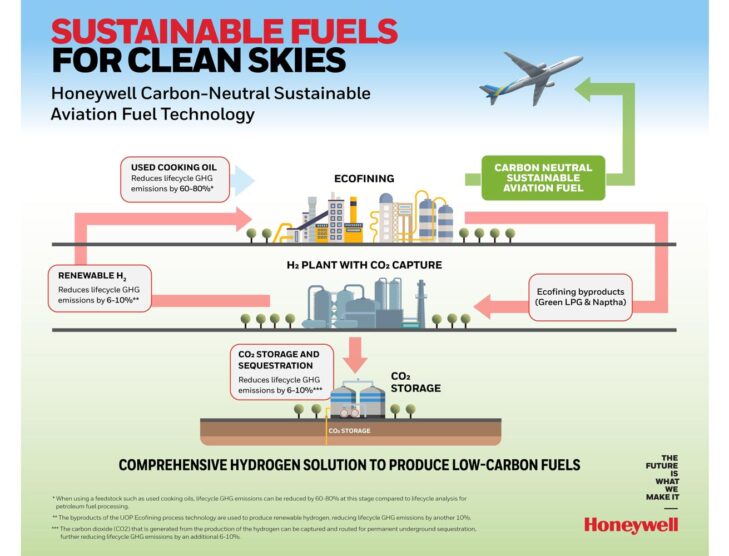
Honeywell and Wood integrate their technologies to produce SAF
Honeywell and Wood announced a comprehensive package of technologies to support the effort to produce sustainable aviation fuel (SAF). When used together, the technologies, which are based on Honeywell’s UOP Ecofining process technology and Wood’s hydrogen plant technology, could reduce lifecycle greenhouse gas emissions (GHG) by 100% using certain feedstocks when compared to traditional petroleum aviation fuel.
The UOP Ecofining process technology converts waste oils, fats, and greases into Honeywell Green Jet FuelTM, a drop-in replacement for jet fuel. When using a feedstock such as used cooking oils, lifecycle GHG emissions can be reduced by 80% at this stage compared to conventional petroleum jet fuel.
Integrating Wood’s technology to use by-products
As the next step in enhancing the Ecofining process technology offering, Wood’s technology will be integrated to use the by-products of the UOP Ecofining process technology to produce renewable hydrogen, reducing lifecycle GHG emissions a further 10% when compared to the total GHG emissions produced by conventional petroleum jet fuel. The renewable hydrogen is then injected back into the Honeywell Ecofining process to remove feed impurities and create a cleaner burning renewable fuel.
The carbon dioxide (CO2) that is generated from the production of the hydrogen can be captured and routed for permanent underground sequestration using the Honeywell H2 Solutions technology suite, further reducing lifecycle GHG emissions an additional 10% when compared to the total GHG emissions produced by conventional petroleum jet fuel. The combination of technologies results in an aviation fuel that is effectively carbon neutral compared to petroleum fuels.
“The combination of these technologies from Honeywell and Wood greatly reduces fossil carbon dioxide emissions compared to traditional fuels by using byproducts to provide hydrogen for the Ecofining process,” said Ben Owens, vice president and general manager of Honeywell Sustainable Technology Solutions. “As a result, a renewable fuels refinery can be essentially self-sustaining in hydrogen production while reducing the carbon intensity of the renewable fuels to very low levels.”
“Wood has a rich history of collaborating on technology developments with Honeywell and together we are now producing solutions for the production of carbon-neutral renewable fuels,” said Andy Hemingway, president, Energy, Optimization, and Innovation, at Wood. “This solution utilizes our long-established experience in hydrogen plant technology to help fuel producers reduce operating costs while meeting sustainability goals with proven, reliable and efficient technologies.”









